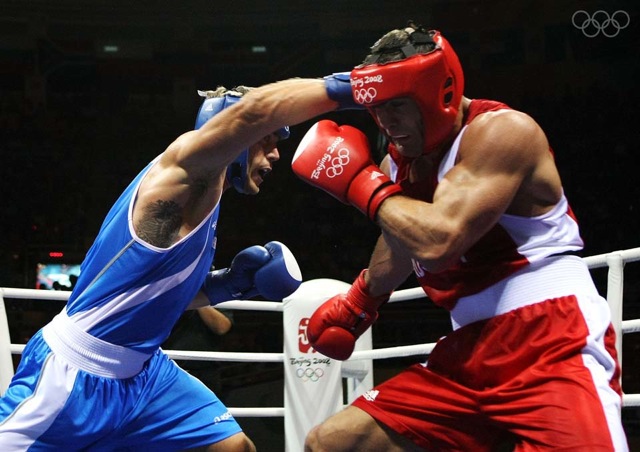
Boxing at Beijing-2008: failure in China brought out major change in Cuba. Foto: Nick Laham/Getty Images/Publicity.
What does it matter is the jab comes from the left or the right, when it’s landing spot-on? To GRACIEMAG, Jiu-Jitsu and everything surrounding it should be seen in this light, as well. The submission can come from the right or the left—so long as it’s true, effective, honest.
Honesty was what we found today, as we opened the sports section of “O Globo” newspaper, in an article on boxing, sport and children in Havana.
After getting to know Lázaro Pérez, the city’s very first under-34 kg champion of the 9- to 10-year-old division, we sorted the highlights from the article and now serve it on a platter for our gentle readers to enjoy. No politics, and from whichever side the customer prefers.
INVESTING IN THE YOUTH
Although it’s a novelty in Cuba, the under-10-year-old boxing division has been official for some time in other nations, like the USA. “At this age we teach them basic movements and punches and how to defend themselves. The idea is to move the kids into more advanced categories already with a strong foundation of technique,” teaches Jo De Vrieze, a Belgian who coaches children in a neighborhood of Havana.
MAXIMUM SAFETY AND ZEAL FOR THE KIDS
“The rules are strict so pre-teen tournaments will be safe. A doctor examines the pugilists before each bout and the referee watches closely,” it says in the article, written using information form the Associated Press (AP). “The bouts are limited to three 50-second rounds. The use of head gear is mandatory.”
MARTIAL ARTS & DISCIPLINE
After some vexing results at the Beijing Olympics—2008 (not a single gold medal), the Boxing World Championship in Italy—2009 and the Pan-American Championship, the Cuban sporting authorities said they felt humiliated. And they attacked the problem with reforms, not excuses. “The first measure taken was to bring in a new coach, Rolando Acebal, to emphasize discipline,” it says in the article. “The change was decisive,” said Félix Savón, 44, a Cuban boxing legend and three-time Olympic champion who said in the article, “With Acebal, some things that had been lost were recovered.”
The results for the country are already beginning to show, like the two gold medals at the World Championship in Baku and the eight medals in nine divisions at the Pan in Guadalajara. But the big test will be at London-2012.
Seasoned teachers taking care of the youth levels, putting an effort in developing discipline. Now to you, gentle reader, is this the right formula to use in the study of martial arts and winning gold down the road? Comment below.
http://www.youtube.com/watch?v=0fIiiY2dxcI
The post The lessons of Cuba in boxing, Jiu-Jitsu and other sports first appeared on Graciemag.